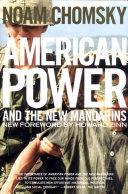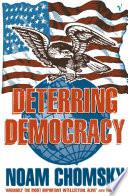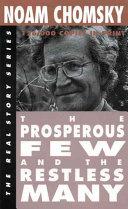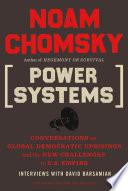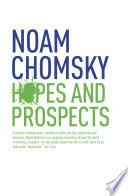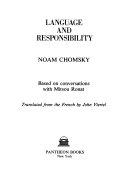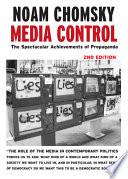“It's only terrorism if they do it to us. When we do much worse to them, it's not terrorism.”
Source: Media Control: The Spectacular Achievements of Propaganda
Avram Noam Chomsky is an American linguist, philosopher, cognitive scientist, historian, social critic, and political activist. Sometimes described as "the father of modern linguistics," Chomsky is also a major figure in analytic philosophy and one of the founders of the field of cognitive science. He is the author of over 100 books on topics such as linguistics, war, politics, and mass media. Ideologically, he aligns with anarcho-syndicalism and libertarian socialism. He holds a joint appointment as Institute Professor Emeritus at the Massachusetts Institute of Technology and laureate professor at the University of Arizona.
Born to middle-class Ashkenazi Jewish immigrants in Philadelphia, Chomsky developed an early interest in anarchism from alternative bookstores in New York City. At the age of 16 he began studies at the University of Pennsylvania, taking courses in linguistics, mathematics, and philosophy. From 1951 to 1955 he was appointed to Harvard University's Society of Fellows, where he developed the theory of transformational grammar for which he was awarded his doctorate in 1955. That year he began teaching at MIT, in 1957 emerging as a significant figure in the field of linguistics for his landmark work Syntactic Structures, which remodeled the scientific study of language, while from 1958 to 1959 he was a National Science Foundation fellow at the Institute for Advanced Study. He is credited as the creator or co-creator of the universal grammar theory, the generative grammar theory, the Chomsky hierarchy, and the minimalist program. Chomsky also played a pivotal role in the decline of behaviorism, being particularly critical of the work of B. F. Skinner.
An outspoken opponent of U.S. involvement in the Vietnam War, which he saw as an act of American imperialism, in 1967 Chomsky attracted widespread public attention for his anti-war essay "The Responsibility of Intellectuals". Associated with the New Left, he was arrested multiple times for his activism and placed on President Richard Nixon's Enemies List. While expanding his work in linguistics over subsequent decades, he also became involved in the Linguistics Wars. In collaboration with Edward S. Herman, Chomsky later co-wrote an analysis articulating the propaganda model of media criticism, and worked to expose the Indonesian occupation of East Timor. Additionally, his defense of unconditional freedom of speech – including for Holocaust deniers – generated significant controversy in the Faurisson affair of the early 1980s. Following his retirement from active teaching, he has continued his vocal political activism, including opposing the War on Terror and supporting the Occupy movement.
One of the most cited scholars in history, Chomsky has influenced a broad array of academic fields. He is widely recognized as a paradigm shifter who helped spark a major revolution in the human sciences, contributing to the development of a new cognitivistic framework for the study of language and the mind. In addition to his continued scholarly research, he remains a leading critic of U.S. foreign policy, neoliberalism and contemporary state capitalism, the Israeli–Palestinian conflict, and mainstream news media. His ideas have proved highly significant within the anti-capitalist and anti-imperialist movements, but have also drawn criticism, with some accusing Chomsky of anti-Americanism.

“It's only terrorism if they do it to us. When we do much worse to them, it's not terrorism.”
Source: Media Control: The Spectacular Achievements of Propaganda
Source: Quotes 1990s, 1995-1999, The Common Good (1998)
“If we don't believe in free expression for people we despise, we don't believe in it at all.”
Noam Chomsky in interview by John Pilger on BBC's The Late Show, November 25, 1992 http://jmm.aaa.net.au/articles/14177.htm.
Quotes 1990s, 1990-1994
Source: Propaganda and the Public Mind: Conversations with Noam Chomsky and David Barsamian
They would be overjoyed. The trial would be over. He would be sent away for multiple life sentences - if it was a U.S. trial, immediately the electric chair.
Interview by David Barsamian on Alternative Radio, June 11, 2004 http://www.isreview.org/issues/37/chomsky.shtml
Quotes 2000s, 2004
Manufacturing Consent, lecture at the University of Wisconsin (15 March 1989) https://chomsky.info/19890315/.
Quotes 1960s-1980s, 1980s
Interview by Yifat Susskind, August 2001 http://www.madre.org/articles/chomsky-0801.html.
Quotes 2000s, 2001
Context: Take the Kyoto Protocol. Destruction of the environment is not only rational; it's exactly what you're taught to do in college. If you take an economics or a political science course, you're taught that humans are supposed to be rational wealth accumulators, each acting as an individual to maximize his own wealth in the market. The market is regarded as democratic because everybody has a vote. Of course, some have more votes than others because your votes depend on the number of dollars you have, but everybody participates and therefore it's called democratic. Well, suppose that we believe what we are taught. It follows that if there are dollars to be made, you destroy the environment. The reason is elementary. The people who are going to be harmed by this are your grandchildren, and they don't have any votes in the market. Their interests are worth zero. Anybody that pays attention to their grandchildren's interests is being irrational, because what you're supposed to do is maximize your own interests, measured by wealth, right now. Nothing else matters. So destroying the environment and militarizing outer space are rational policies, but within a framework of institutional lunacy. If you accept the institutional lunacy, then the policies are rational.
“The very design of neoliberal principles is a direct attack on democracy.”
Source: Hopes and Prospects
Quotes 1990s, 1990-1994, Manufacturing Consent: Noam Chomsky and the Media, 1992
Context: Modern industrial civilization has developed within a certain system of convenient myths. The driving force of modern industrial civilization has been individual material gain, which is accepted as legitimate, even praiseworthy, on the grounds that private vices yield public benefits, in the classic formulation. Now, it has long been understood, very well, that a society that is based on this principle will destroy itself in time. It can only persist, with whatever suffering and injustice that it entails, as long as it is possible to pretend that the destructive forces that humans create are limited, that the world is an infinite resource, and that the world is an infinite garbage can. At this stage of history either one of two things is possible. Either the general population will take control of its own destiny and will concern itself with community interests, guided by values of solidarity, sympathy and concern for others, or alternatively there will be no destiny for anyone to control. As long as some specialized class is in a position of authority, it is going to set policy in the special interests that it serves. But the conditions of survival, let alone justice, require rational social planning in the interests of the community as a whole, and by now that means the global community. The question is whether privileged elite should dominate mass communication and should use this power as they tell us they must—namely to impose necessary illusions, to manipulate and deceive the stupid majority and remove them from the public arena. The question in brief, is whether democracy and freedom are values to be preserved or threats to be avoided. In this possibly terminal phase of human existence, democracy and freedom are more than values to be treasured; they may well be essential to survival.
Quotes 1990s, 1990-1994, Manufacturing Consent: Noam Chomsky and the Media, 1992
Context: If you believe in freedom of speech, you believe in freedom of speech for views you don't like. Goebbels was in favor of freedom of speech for views he liked. So was Stalin. If you're in favor of freedom of speech, that means you're in favor of freedom of speech precisely for views you despise.
Quotes 1990s, 1990-1994, Manufacturing Consent: Noam Chomsky and the Media, 1992
Context: We're not analyzing the media on Mars or in the eighteenth century or something like that. We're dealing with real human beings who are suffering and dying and being tortured and starving because of policies that we are involved in, we as citizens of democratic societies are directly involved in and are responsible for, and what the media are doing is ensuring that we do not act on our responsibilities, and that the interests of power are served, not the needs of the suffering people, and not even the needs of the American people who would be horrified if they realized the blood that's dripping from their hands because of the way they are allowing themselves to be deluded and manipulated by the system.
Talk titled "On West Asia" at UC Berkeley, March 21, 2002 http://www.chomsky.info/talks/20020321.htm.
Quotes 2000s, 2002
Context: [Israel's military occupation is] in gross violation of international law and has been from the outset. And that much, at least, is fully recognized, even by the United States, which has overwhelming and, as I said, unilateral responsibility for these crimes. So George Bush No. 1, when he was the U. N. ambassador, back in 1971, he officially reiterated Washington's condemnation of Israel's actions in the occupied territories. He happened to be referring specifically to occupied Jerusalem. In his words, actions in violation of the provisions of international law governing the obligations of an occupying power, namely Israel. He criticized Israel's failure "to acknowledge its obligations under the Fourth Geneva Convention as well as its actions which are contrary to the letter and spirit of this Convention." [... ] However, by that time, late 1971, a divergence was developing, between official policy and practice. The fact of the matter is that by then, by late 1971, the United States was already providing the means to implement the violations that Ambassador Bush deplored. [... ] on December 5th [2001], there had been an important international conference, called in Switzerland, on the 4th Geneva Convention. Switzerland is the state that's responsible for monitoring and controlling the implementation of them. The European Union all attended, even Britain, which is virtually a U. S. attack dog these days. They attended. A hundred and fourteen countries all together, the parties to the Geneva Convention. They had an official declaration, which condemned the settlements in the occupied territories as illegal, urged Israel to end its breaches of the Geneva Convention, some "grave breaches," including willful killing, torture, unlawful deportation, unlawful depriving of the rights of fair and regular trial, extensive destruction and appropriation of property not justified by military necessity and carried out unlawfully and wantonly. Grave breaches of the Geneva Convention, that's a serious term, that means serious war crimes. The United States is one of the high contracting parties to the Geneva Convention, therefore it is obligated, by its domestic law and highest commitments, to prosecute the perpetrators of grave breaches of the conventions. That includes its own leaders. Until the United States prosecutes its own leaders, it is guilty of grave breaches of the Geneva Convention, that means war crimes. And it's worth remembering the context. It is not any old convention. These are the conventions established to criminalize the practices of the Nazis, right after the Second World War. What was the U. S. reaction to the meeting in Geneva? The U. S. boycotted the meeting... and that has the usual consequence, it means the meeting is null and void, silence in the media.
Quotes 1990s, 1990-1994, Noam Chomsky: A Life of Dissent, 1992
Context: There is a noticeable general difference between the sciences and mathematics on the one hand, and the humanities and social sciences on the other. It's a first approximation, but one that is real. In the former, the factors of integrity tend to dominate more over the factors of ideology. It's not that scientists are more honest people. It's just that nature is a harsh taskmaster. You can lie or distort the story of the French Revolution as long as you like, and nothing will happen. Propose a false theory in chemistry, and it'll be refuted tomorrow.
“Mass education was designed to turn independent farmers into docile, passive tools of production.”
Quotes 1990s, 1995-1999, Class Warfare, 1995
Context: Mass education was designed to turn independent farmers into docile, passive tools of production. That was its primary purpose. And don't think people didn't know it. They knew it and they fought against it. There was a lot of resistance to mass education for exactly that reason. It was also understood by the elites. Emerson once said something about how we're educating them to keep them from our throats. If you don't educate them, what we call "education," they're going to take control -- "they" being what Alexander Hamilton called the "great beast," namely the people. The anti-democratic thrust of opinion in what are called democratic societies is really ferocious. And for good reason. Because the freer the society gets, the more dangerous the great beast becomes and the more you have to be careful to cage it somehow.
Chomsky on Miseducation, 1999 http://www-rohan.sdsu.edu/~rgibson/rouge_forum/newspaper/fall2001/Chomsky.htm.
Quotes 1990s, 1995-1999
Context: Because they don't teach the truth about the world, schools have to rely on beating students over the head with propaganda about democracy. If schools were, in reality, democratic, there would be no need to bombard students with platitudes about democracy. They would simply act and behave democratically, and we know this does not happen. The more there is a need to talk about the ideals of democracy, the less democratic the system usually is.
“This was slaughter, not war.”
Z Magazine, August 31, 1991 http://www.zmag.org/chomsky/articles/z9110-aftermath.html.
Quotes 1990s, 1990-1994
Context: The crisis began with the Iraqi invasion of Kuwait a year ago. There was some fighting, leaving hundreds killed according to Human Rights groups. That hardly qualifies as war. Rather, in terms of crimes against peace and against humanity, it falls roughly into the category of the Turkish invasion of northern Cyprus, Israel's invasion of Lebanon in 1978, and the U. S. invasion of Panama. In these terms it falls well short of Israel's 1982 invasion of Lebanon, and cannot remotely be compared with the near-genocidal Indonesian invasion and annexation of East Timor, to mention only two cases of aggression that are still in progress, with continuing atrocities and with the crucial support of those who most passionately professed their outrage over Iraq's aggression. During the subsequent months, Iraq was responsible for terrible crimes in Kuwait, with several thousand killed and many tortured. But that is not war; rather, state terrorism, of the kind familiar among U. S. clients. The second phase of the conflict began with the U. S.-U. K. attack of January 15 (with marginal participation of others). This was slaughter http://www.hrw.org/reports/1991/gulfwar/index.htm, not war.
Quotes 1990s, 1990-1994, Interview by Adam Jones, 1990
Context: In the United States, the political system is a very marginal affair. There are two parties, so-called, but they're really factions of the same party, the Business Party. Both represent some range of business interests. In fact, they can change their positions 180 degrees, and nobody even notices. In the 1984 election, for example, there was actually an issue, which often there isn't. The issue was Keynesian growth versus fiscal conservatism. The Republicans were the party of Keynesian growth: big spending, deficits, and so on. The Democrats were the party of fiscal conservatism: watch the money supply, worry about the deficits, et cetera. Now, I didn't see a single comment pointing out that the two parties had completely reversed their traditional positions. Traditionally, the Democrats are the party of Keynesian growth, and the Republicans the party of fiscal conservatism. So doesn't it strike you that something must have happened? Well, actually, it makes sense. Both parties are essentially the same party. The only question is how coalitions of investors have shifted around on tactical issues now and then. As they do, the parties shift to opposite positions, within a narrow spectrum.
“You can't have non-violent resistance against the Nazis in a concentration camp”
Chronicles of Dissent, December 13, 1989 http://www.zmag.org/chomsky/interviews/db-8912.html
Quotes 1960s-1980s, 1980s
Context: Non-violent resistance activities cannot succeed against an enemy that is able freely to use violence. That's pretty obvious. You can't have non-violent resistance against the Nazis in a concentration camp, to take an extreme case...
Quotes 1990s, 1990-1994, Interview by Adam Jones, 1990
Context: In the United States, the political system is a very marginal affair. There are two parties, so-called, but they're really factions of the same party, the Business Party. Both represent some range of business interests. In fact, they can change their positions 180 degrees, and nobody even notices. In the 1984 election, for example, there was actually an issue, which often there isn't. The issue was Keynesian growth versus fiscal conservatism. The Republicans were the party of Keynesian growth: big spending, deficits, and so on. The Democrats were the party of fiscal conservatism: watch the money supply, worry about the deficits, et cetera. Now, I didn't see a single comment pointing out that the two parties had completely reversed their traditional positions. Traditionally, the Democrats are the party of Keynesian growth, and the Republicans the party of fiscal conservatism. So doesn't it strike you that something must have happened? Well, actually, it makes sense. Both parties are essentially the same party. The only question is how coalitions of investors have shifted around on tactical issues now and then. As they do, the parties shift to opposite positions, within a narrow spectrum.
“Education is a system of imposed ignorance.”
Source: Manufacturing Consent: The Political Economy of the Mass Media
“Propaganda is to a democracy what the bludgeon is to a totalitarian state.”
interview on WBAI, January 1992 http://www.chomsky.info/interviews/199201--.htm.
Quotes 1990s, 1990-1994
Variant: Propaganda is to democracy what the bludgeon is to a totalitarian state.
Source: Media Control: The Spectacular Achievements of Propaganda
Context: Harold Laswell … explained a couple of years after this in the early 1930s that we should not succumb to what he called democratic dogmatisms about men being the best judges of their own interests.… In what's nowadays called a totalitarian state, military state or something, it's easy. You just hold a bludgeon over their heads, but as societies become more free and democratic you lose that capacity and therefore you have to turn to the techniques of propaganda. The logic is clear—propaganda is to a democracy what the bludgeon is to a totalitarian state….
Context: Walter Lippmann … described what he called “the manufacture of consent” as “a revolution” in “the practice of democracy”... And he said this was useful and necessary because “the common interests” - the general concerns of all people - “elude” the public. The public just isn't up to dealing with them. And they have to be the domain of what he called a "specialized class" … [Reinhold Niebuhr]'s view was that rationality belongs to the cool observer. But because of the stupidity of the average man, he follows not reason, but faith. And this naive faith requires necessary illusion, and emotionally potent oversimplifications, which are provided by the myth-maker to keep the ordinary person on course. It's not the case, as the naive might think, that indoctrination is inconsistent with democracy. Rather, as this whole line of thinkers observes, it is the essence of democracy. The point is that in a military state or a feudal state or what we would now call a totalitarian state, it doesn't much matter because you've got a bludgeon over their heads and you can control what they do. But when the state loses the bludgeon, when you can't control people by force, and when the voice of the people can be heard, you have this problem—it may make people so curious and so arrogant that they don't have the humility to submit to a civil rule [Clement Walker, 1661], and therefore you have to control what people think. And the standard way to do this is to resort to what in more honest days used to be called propaganda, manufacture of consent, creation of necessary illusion. Various ways of either marginalizing the public or reducing them to apathy in some fashion.
“… the Bible is probably the most genocidal book in the literary canon.”
Quotes 2000s, 2004, Interview by Wallace Shawn, 2004
Context: You can find things in the traditional religions which are very benign and decent and wonderful and so on, but I mean, the Bible is probably the most genocidal book in the literary canon. The God of the Bible - not only did He order His chosen people http://www.bible.org/netbible/1sa15.htm to carry out literal genocide - I mean, wipe out every Amalekite to the last man, woman, child, and, you know, donkey and so on, because hundreds of years ago they got in your way when you were trying to cross the desert - not only did He do things like that, but, after all, the God of the Bible was ready to destroy every living creature on earth because some humans irritated Him. That's the story of Noah. I mean, that's beyond genocide - you don't know how to describe this creature. Somebody offended Him, and He was going to destroy every living being on earth? And then He was talked into allowing two of each species to stay alive - that's supposed to be gentle and wonderful.
Debate with Bill Bennett on CNN, May 30, 2002 http://www.radio4all.net/index.php?op=program-info&program_id=11118
Quotes 2000s, 2002
Herman and Chomsky (1988), Manufacturing Consent, p. 252.
Quotes 1960s-1980s, 1980s
Talk titled "U.S. Foreign Policy in a Globalized World" at Johns Hopkins University, Maryland, March 13, 2000 https://web.archive.org/web/20021220030406/http://www.gseis.ucla.edu/faculty/kellner/ed270/multimedia.html.
Quotes 2000s, 2000
Interview http://www.thirdworldtraveler.com/Chomsky/Chomsky_Tapes_MAlbert.html with Michael Albert (January 1993)
Quotes 1990s, 1990-1994
Science in the Dock (2011), 2, Chomsky.info, March 1, 2006, August 16, 2011 http://www.chomsky.info/debates/20060301.htm,
Quotes 2010s, 2011
Deterring Democracy, 1992 https://web.archive.org/web/20000603124454/http://www.zmag.org/chomsky/dd/dd-c04-s05.html.
Quotes 1990s, 1990-1994
Talk titled "Language & Mind", 1997.
Quotes 1990s, 1995-1999
Speech on “Lenin, Trotsky and Socialism and the Soviet Union”, (March 15, 1989) https://www.youtube.com/watch?v=yQsceZ9skQI
Quotes 1960s–1980s, 1980s
“The president is not the first to ask: "Why do they hate us?"”
The Guardian, September 9, 2002 http://www.chomsky.info/articles/20020909.htm.
Quotes 2000s, 2002
Context: September 11 shocked many Americans into an awareness that they had better pay much closer attention to what the US government does in the world and how it is perceived. Many issues have been opened for discussion that were not on the agenda before. That's all to the good. It is also the merest sanity, if we hope to reduce the likelihood of future atrocities. It may be comforting to pretend that our enemies "hate our freedoms," as President Bush stated, but it is hardly wise to ignore the real world, which conveys different lessons. The president is not the first to ask: "Why do they hate us?" In a staff discussion 44 years ago, President Eisenhower described "the campaign of hatred against us [in the Arab world], not by the governments but by the people". His National Security Council outlined the basic reasons: the US supports corrupt and oppressive governments and is "opposing political or economic progress" because of its interest in controlling the oil resources of the region.... What they hate is official policies that deny them freedoms to which they aspire.
Q&A with community activists, February 10, 1989.
Quotes 1960s-1980s, 1980s
Context: If any of you have ever looked at your FBI file, you discover that intelligence agencies in general are extremely incompetent. That's one of the reasons why there are so many intelligence failures. They just never get anything straight, for all kinds of reasons. Part of it is because of the information they get. The information they get comes from ideological fanatics, typically, who always misunderstand things in their own crazy way. If you look at an FBI file, say, about yourself, where you know what the facts are, you'll see that the information has some kind of relation to the facts, you can figure out what they're talking about, but by the time it works its way through the ideological fanaticism of the intelligence agencies, there's always weird distortion.
Interview by Mary Lou Finlay on CBC radio, April 16, 1999 (further details: Justin Podur http://www.zmag.org/content/showarticle.cfm?SectionID=11&ItemID=5817, Noam Chomsky http://chomsky.info/articles/20041217.htm) http://www.chomsky.info/interviews/19990416.htm.
Quotes 1990s, 1995-1999
Context: For example, take Suharto's Indonesia, which is a brutal, murderous state. I think Canada was supporting it all the way through, because it was making money out of the situation. And we can go around the world. Canada strongly supported the US invasion of South Vietnam, the whole of Indochina. In fact Canada became the per capita largest war exporter, trying to make as much money as it could from the murder of people in Indochina. In fact, I'd suggest that you look back at the comment by a well known and respected Canadian diplomat, I think his name was John Hughes, some years ago, who defined what he called the Canadian idea, namely "we uphold our principles but we find a way around them". Well, that's pretty accurate. And Canada is not unique in this respect, maybe a little more hypocritical.
“Similarly, if an editorial writer for the New York Times were to start, say, telling the truth”
Quotes 1990s, 1990-1994, Interview by Adam Jones, 1990
Context: Boards of Directors have to make certain kinds of decisions, and those decisions are pretty narrowly constrained. They have to be committed to increasing profit share and market share. That means they're going to be forced to try to limit wages, to limit quality, to use advertising in a way that sells goods even if the product is lousy. Who tells them to do this? Nobody. But if they stopped doing it, they'd be out of business. Similarly, if an editorial writer for the New York Times were to start, say, telling the truth about the Panama invasion -- which is almost inconceivable, because to become an editorial writer you'd already have gone through a filtering process which would weed out the non-conformists -- well, the first thing that would happen is you'd start getting a lot of angry phone calls from investors, owners, and other sectors of power. That would probably suffice. If it didn't, you'd simply see the stock start falling. And if they continued with it systematically, the New York Times would be replaced by some other organ. After all, what is the New York Times? It's just a corporation. If investors and advertisers don't want to support it, and the government doesn't want to give it the special privileges and advantages that make it a "newspaper of record," it's out of business.
In Understanding Power, 2002.
Quotes 2000s, 2002
Context: ... another thing you sometimes find in non-literate cultures is development of the most extraordinary linguistic systems: often there's tremendous sophistication about language, and people play all sorts of games with language. So there are puberty rites where people who go through the same initiation period develop their own language that's usually some modification of the actual language, but with quite complex mental operations differentiating it -- then that's theirs for the rest of their lives, and not other people's. And what all these things look like is that people just want to use their intelligence somehow, and if you don't have a lot of technology and so on, you do other things. Well, in our society, we have things that you might use your intelligence on, like politics, but people really can't get involved in them in a very serious way -- so what they do is they put their minds into other things, such as sports. You're trained to be obedient; you don't have an interesting job; there's no work around for you that's creative; in the cultural environment you're a passive observer of usually pretty tawdry stuff; political and social life are out of your range, they're in the hands of the rich folks. So what's left? Well, one thing that's left is sports -- so you put a lot of the intelligence and the thought and the self-confidence into that. And I suppose that's also one of the basic functions it serves in the society in general: it occupies the population, and keeps them from trying to get involved with things that really matter.
Power and Terror: Noam Chomsky in Our Times (2002) documentary film
Quotes 2000s, 2002
Context: If you take a poll among U. S. intellectuals, support for bombing Afghanistan is just overwhelming, but how many of them think that you should bomb Washington because of the U. S. war against Nicaragua, let's say, or Cuba or Turkey, or anyone else? Now if anyone were to suggest this, they'd be considered insane, but why? I mean, if one is right, why is the other wrong? When you try to get someone to talk about this question, they just won't try. They can't comprehend what your question is, because you can't comprehend that we should apply to ourselves the standards that you apply to others. That is incomprehensible! There couldn't be a moral principle more elementary... There's a famous definition in the Gospels of the hypocrite. The hypocrite is the person who refuses to apply to himself the standards that he applies to others. By that standard, the entire commentary and discussion of the so-called "war on terror" is pure hypocrisy, virtually without exception. Can anybody understand that? No, can't understand that. But that's not so unusual... I know it was true in Germany and France and everywhere else. It's just standard. It's ugly, but it's standard.
“And by intervening with force and violence to suppress and destroy any attempt”
Quotes 1960s-1980s, 1980s, Talk at University of California, Berkeley, 1984
Context: Rio de Janeiro, incidentally, is not the poor part of the country, that sort of the rich part of the country. It's not the northeast, where 35 million people or so, nobody knows what happens to them, or cares. But Rio de Janeiro, that's where people are looking, the rich parts. And this journal is a science journal, kinda like Science in the United States. It was studying malnutrition. And here's the figures it had for Rio de Janeiro: infants from 0 to 5 months, severe malnutrition, meaning medically severe, 67%; 5 months to a year, 41%; a year to 5 years, 11%. Now the reason of course for the decline, from 67 to 41 to 11, is that they will die. So that's what happens under the conditions of the economic miracle, like in Guatemala. Now, it's a little wrong to say that the people die. The fact is, they don't die. We kill them, that's what happens. We kill them by carrying out policies, supporting the regimes of the kind that I've described. And by intervening with force and violence to suppress and destroy any attempt, however minimal, even on a speck like Grenada, we've got to stop any attempt to bring some change into this. That's the history of our hemisphere.
Quotes 2000s, 2002, Talk at the University of Houston, 2002
Context: There's one white powder which is by far the most lethal known. It's called sugar. If you look at the history of imperialism, a lot of it has to do with that. A lot of the imperial conquest, say in the Caribbean, set up a kind of a network... The Caribbean back in the 18th century was a soft drug producer: sugar, rum, tobacco, chocolate. And in order to do it, they had to enslave Africans, and it was done largely to pacify working people in England who were being driven into awful circumstances by the early industrial revolution. That's why so many wars took place around the Caribbean.
“We have a big argument here about whether Nicaragua and Cuba are sending arms to El Salvador.”
Quotes 1960s-1980s, 1980s, Talk at University of California, Berkeley, 1984
Context: We have a big argument here about whether Nicaragua and Cuba are sending arms to El Salvador. Well, I don't know, so far there's no evidence that they are, but that's not really the interesting question. I mean, you gotta watch the way questions are framed by the propaganda system. The way it's framed is, the doves say they're not sending arms, and the hawks say they are sending arms. But the real question, which is being suppressed in all of this, is, "Should they be sending arms?" And the answer is of course, "Yes." [applause] Everybody should be sending arms. You see, that question is not raised, just as if somebody was talking in, say, the Soviet Union, and the question came up: "Should somebody send arms to Afghan rebels?" Well, of course not. You know, that's terrorism or something like that. The point is that it's perfectly legitimate to send arms to people who finally try to use violence in self-defense against a gang of mass murderers installed by a foreign power. Of course it's legitimate to send them arms.
Quotes 1990s, 1995-1999, The Common Good (1998)
Context: Property rights are not like other rights, contrary to what Madison and a lot of modern political theory says. If I have the right to free speech, it doesn't interfere with your right to free speech. But if I have property, that interferes with your right to have that property, you don't have it, I have it. So the right to property is very different from the right to freedom of speech. This is often put very misleadingly about rights of property; property has no right. But if we just make sense out of this, maybe there is a right to property, one could debate that, but it's very different from other rights.
Quotes 1990s, 1990-1994, Noam Chomsky: A Life of Dissent, 1992
Context: I never criticized United States planners for mistakes in Vietnam. True, they made some mistakes, but my criticism was always aimed at what they aimed to do and largely achieved. The Russians doubtless made mistakes in Afghanistan, but my condemnation of their aggression and atrocities never mentioned those mistakes, which are irrelevant to the matter -- though not for the commissars. Within our ideological system, it is impossible to perceive that anyone might criticize anything but "mistakes" (I suspect that totalitarian Russia was more open in that regard).
“The Tet Offensive in January of 1968”
interview by David Cogswell, September 14, 1993 (see also: Rethinking Camelot http://www.zmag.org/chomsky/rc/rc-contents.html, Boston Review http://www.chomsky.info/letters/200312--.htm) http://www.davidcogswell.com/Political/Chomsky_Interview_93.htm.
Quotes 1990s, 1990-1994
Context: The Tet Offensive in January of 1968 [... ] made the war unpopular. American corporate elites decided at that point that it just wasn't worth it, it was too costly, let's pull out. So at that time everybody became an opponent of the war because the orders from on high were that you were supposed to be opposed to it. And after that every single memoirist radically changed their story about what had happened. They all concocted this story that their hero, John F. Kennedy, was really planning to pull out of this unpopular war before he was killed and then Johnson changed it. If you look at the earlier memoirs, not a hint, I mean literally.
“Where the voice of the people is heard, elite groups must insure their voice says the right things”
“Though Control in the USA: The Case of the Middle East,” Index on Censorship, July/August 1986, quoted in John H. George, Be Reasonable: Selected Quotations for Inquiring Minds, Prometheus Books, 1994 p. 64
Quotes 1960s-1980s, 1980s
Context: From a comparative perspective, the United States is unusual if not unique in the lack of restraints on freedom of expression. It is also unusual in the range and effectiveness of methods employed to restrain freedom of thought... Where the voice of the people is heard, elite groups must insure their voice says the right things… The less the state is able to employ violence in the defense of the interest of the elite groups that effectively dominate it, the more it becomes necessary to devise techniques of ‘manufacture of consent’… Where obedience is guaranteed by violence, rulers may tend towards a ‘behaviourist’ conception; it is enough that people obey; what they think does not matter too much. Where the state lacks means of coercion, it is important to control what people think.
Talk titled "The Lessons of Vietnam", March 31, 1985; Republished at " Program Information: The Lessons of Viet Nam http://www.radio4all.net/index.php?op=program-info&program_id=11149" at radio4all.net, accessed May 23, 2014.
Quotes 1960s-1980s, 1980s
Context: It goes back to the days when we were defending ourselves against the internal aggression of the Native American population, who we incidentally wiped out in the process. In the post World War II period, we've frequently had to carry out defense against internal aggression, that is against Salvadorans in El Salvador, Greeks in Greece, against Filipinos in the Philippines, against South Vietnamese in South Vietnam, and many other places. And the concept of internal aggression has been repeatedly invoked in this connection, and quite appropriately. It's an interesting concept, it's one that George Orwell would certainly have admired, and it's elaborated in many ways in the internal documentary record.
Quotes 1990s, 1990-1994, Manufacturing Consent: Noam Chomsky and the Media, 1992
Context: Modern industrial civilization has developed within a certain system of convenient myths. The driving force of modern industrial civilization has been individual material gain, which is accepted as legitimate, even praiseworthy, on the grounds that private vices yield public benefits, in the classic formulation. Now, it has long been understood, very well, that a society that is based on this principle will destroy itself in time. It can only persist, with whatever suffering and injustice that it entails, as long as it is possible to pretend that the destructive forces that humans create are limited, that the world is an infinite resource, and that the world is an infinite garbage can. At this stage of history either one of two things is possible. Either the general population will take control of its own destiny and will concern itself with community interests, guided by values of solidarity, sympathy and concern for others, or alternatively there will be no destiny for anyone to control. As long as some specialized class is in a position of authority, it is going to set policy in the special interests that it serves. But the conditions of survival, let alone justice, require rational social planning in the interests of the community as a whole, and by now that means the global community. The question is whether privileged elite should dominate mass communication and should use this power as they tell us they must—namely to impose necessary illusions, to manipulate and deceive the stupid majority and remove them from the public arena. The question in brief, is whether democracy and freedom are values to be preserved or threats to be avoided. In this possibly terminal phase of human existence, democracy and freedom are more than values to be treasured; they may well be essential to survival.
“The United States is not going in there to save the oppressed.”
Interview by Michael Lerner in Tikkun, April 5, 1999 http://www.chomsky.info/interviews/19990405.htm.
Quotes 1990s, 1995-1999
Context: The United States is not going in there to save the oppressed. If we wanted to save the oppressed we could have supported the nonviolent movement instead of selling them out at Dayton. Any kind of turbulence in the Balkans is a threat to the interests of rich, privileged, powerful people. Therefore, any turbulence in the Balkans is called a crisis. The same circumstances would not be a crisis were they to occur in Sierra Leone, or Central America, or even Turkey. But in Europe, the heartland of American economic interests, any threat in the Balkans has the possibility of spilling over.
" On Resistance http://www.chomsky.info/articles/19671207.htm", The New York Review of Books, December 7, 1967.
Quotes 1960s-1980s, 1960s
Context: After the first International Days of Protest in October, 1965, Senator Mansfield criticized the "sense of utter irresponsibility" shown by the demonstrators. He had nothing to say then, nor has he since, about the "sense of utter irresponsibility" shown by Senator Mansfield and others who stand by quietly and vote appropriations as the cities and villages of North Vietnam are demolished, as millions of refugees in the South are driven from their homes by American bombardment. He has nothing to say about the moral standards or the respect for international law of those who have permitted this tragedy. I speak of Senator Mansfield precisely because he is not a breast-beating superpatriot who wants America to rule the world, but is rather an American intellectual in the best sense, a scholarly and reasonable man -- the kind of man who is the terror of our age. Perhaps this is merely a personal reaction, but when I look at what is happening to our country, what I find most terrifying is not Curtis LeMay, with his cheerful suggestion that we bomb everybody back into the stone age, but rather the calm disquisitions of the political scientists on just how much force will be necessary to achieve our ends, or just what form of government will be acceptable to us in Vietnam. What I find terrifying is the detachment and equanimity with which we view and discuss an unbearable tragedy. We all know that if Russia or China were guilty of what we have done in Vietnam, we would be exploding with moral indignation at these monstrous crimes.
Talk titled "On West Asia" at UC Berkeley, March 21, 2002 http://www.chomsky.info/talks/20020321.htm.
Quotes 2000s, 2002
Context: [Israel's military occupation is] in gross violation of international law and has been from the outset. And that much, at least, is fully recognized, even by the United States, which has overwhelming and, as I said, unilateral responsibility for these crimes. So George Bush No. 1, when he was the U. N. ambassador, back in 1971, he officially reiterated Washington's condemnation of Israel's actions in the occupied territories. He happened to be referring specifically to occupied Jerusalem. In his words, actions in violation of the provisions of international law governing the obligations of an occupying power, namely Israel. He criticized Israel's failure "to acknowledge its obligations under the Fourth Geneva Convention as well as its actions which are contrary to the letter and spirit of this Convention." [... ] However, by that time, late 1971, a divergence was developing, between official policy and practice. The fact of the matter is that by then, by late 1971, the United States was already providing the means to implement the violations that Ambassador Bush deplored. [... ] on December 5th [2001], there had been an important international conference, called in Switzerland, on the 4th Geneva Convention. Switzerland is the state that's responsible for monitoring and controlling the implementation of them. The European Union all attended, even Britain, which is virtually a U. S. attack dog these days. They attended. A hundred and fourteen countries all together, the parties to the Geneva Convention. They had an official declaration, which condemned the settlements in the occupied territories as illegal, urged Israel to end its breaches of the Geneva Convention, some "grave breaches," including willful killing, torture, unlawful deportation, unlawful depriving of the rights of fair and regular trial, extensive destruction and appropriation of property not justified by military necessity and carried out unlawfully and wantonly. Grave breaches of the Geneva Convention, that's a serious term, that means serious war crimes. The United States is one of the high contracting parties to the Geneva Convention, therefore it is obligated, by its domestic law and highest commitments, to prosecute the perpetrators of grave breaches of the conventions. That includes its own leaders. Until the United States prosecutes its own leaders, it is guilty of grave breaches of the Geneva Convention, that means war crimes. And it's worth remembering the context. It is not any old convention. These are the conventions established to criminalize the practices of the Nazis, right after the Second World War. What was the U. S. reaction to the meeting in Geneva? The U. S. boycotted the meeting... and that has the usual consequence, it means the meeting is null and void, silence in the media.
Interview by John Veit in High Times, April 1998 http://www.hightimes.com/ht/entertainment/content.php?bid=175&aid=2
Quotes 1990s, 1995-1999
Context: If you look into the history of what is called the CIA, which means the US White House, its secret wars, clandestine warfare, the trail of drug production just follows. It started in France after the Second World War when the United States was essentially trying to reinstitute the traditional social order, to rehabilitate Fascist collaborators, wipe out the Resistance and destroy the unions and so on. The first thing they did was reconstitute the Mafia, as strikebreakers or for other such useful services. And the Mafia doesn't do it for fun, so there was a tradeoff: Essentially, they allowed them to reinstitute the heroin production system, which had been destroyed by the Fascists. The Fascists tended to run a pretty tight ship; they didn't want any competition, so they wiped out the Mafia. But the US reconstituted it, first in southern Italy, and then in southern France with the Corsican Mafia. That's where the famous French Connection comes from. That was the main heroin center for many years. Then US terrorist activities shifted over to Southeast Asia. If you want to carry out terrorist activities, you need local people to do it for you, and you also need secret money to pay for it, clandestine hidden money. Well, if you need to hire thugs and murderers with secret money, there aren't many options. One of them is the drug connection. The so-called Golden Triangle around Burma, Laos and Thailand became a big drug producing area with the help of the United States, as part of the secret wars against those populations.
“The long-term goal of the Oslo process”
Interview by Yitzhak Laor in Haaretz, December 29, 2000 http://www.chomsky.info/interviews/20001229.htm.
Quotes 2000s, 2000
Context: The Oslo agreements did represent a shift in U. S.-Israeli policy. Both states had by then come to recognize that it is a mistake to use the Israel Defense Forces to run the territories. It is much wiser to resort to the traditional colonial pattern of relying on local clients to control the subject population, in the manner of the British in India, South Africa under apartheid, the U. S. in Central America, and other classic cases. That is the assigned role of the Palestinian Authority, which like its predecessors, has to follow a delicate path: it must maintain some credibility among the population, while serving as a second oppressor, both militarily and economically, in coordination with the primary power centers that retain ultimate control. The long-term goal of the Oslo process was described accurately by Shlomo Ben-Ami shortly before he joined the Barak government: it is to establish a condition of permanent neo-colonialist dependency. The mechanisms have been spelled out explicitly in the successive interim agreements; and more important, implemented on the ground.

